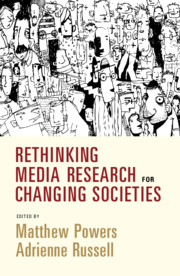Book contents
- Rethinking Media Research for Changing Societies
- Communication, Society and Politics
- Rethinking Media Research for Changing Societies
- Copyright page
- Contents
- Figure
- Contributors
- Acknowledgments
- 1 Introduction
- Part I Living in a Datafied World
- Part II Journalism in Times of Change
- Part III Media and Problems of Inclusion
- Part IV Engagement with and through Media
- Part V The Role of Scholars
- 12 What Is Communication Research For? Wrestling with the Relevance of What We Do
- 13 Communication as Translation
- 14 What Are We Fighting For? Academia or the Humility of Knowledge
- Epilogue
- Other Books in the Series (continued from page ii)
- References
13 - Communication as Translation
Notes toward a New Conceptualization of Communication
from Part V - The Role of Scholars
Published online by Cambridge University Press: 18 September 2020
- Rethinking Media Research for Changing Societies
- Communication, Society and Politics
- Rethinking Media Research for Changing Societies
- Copyright page
- Contents
- Figure
- Contributors
- Acknowledgments
- 1 Introduction
- Part I Living in a Datafied World
- Part II Journalism in Times of Change
- Part III Media and Problems of Inclusion
- Part IV Engagement with and through Media
- Part V The Role of Scholars
- 12 What Is Communication Research For? Wrestling with the Relevance of What We Do
- 13 Communication as Translation
- 14 What Are We Fighting For? Academia or the Humility of Knowledge
- Epilogue
- Other Books in the Series (continued from page ii)
- References
Summary
This chapter argues that scholars need to transform their approaches to knowledge and knowledge production. Guobin Yang suggests that taking a view of communication as translation, as opposed to transmission, community, or ritual, makes central a recognition of difference. Drawing on Walter Benjamin (1968), he argues that, like translators, communication researchers can never overemphasize the ethos of openness and receptiveness to difference inherent to the work and the centrality to media scholarship of pedagogies on listening, learning, and attunement. The role of the communication scholar, he argues, is not just to translate the experiences of those we study, but also to learn from those experiences. He advocates the cultivation of methodological orientations that permit human subjects to teach about their own experiences, rather than explaining those experiences to them in academic jargon.
- Type
- Chapter
- Information
- Rethinking Media Research for Changing Societies , pp. 184 - 194Publisher: Cambridge University PressPrint publication year: 2020
References
- 2
- Cited by

